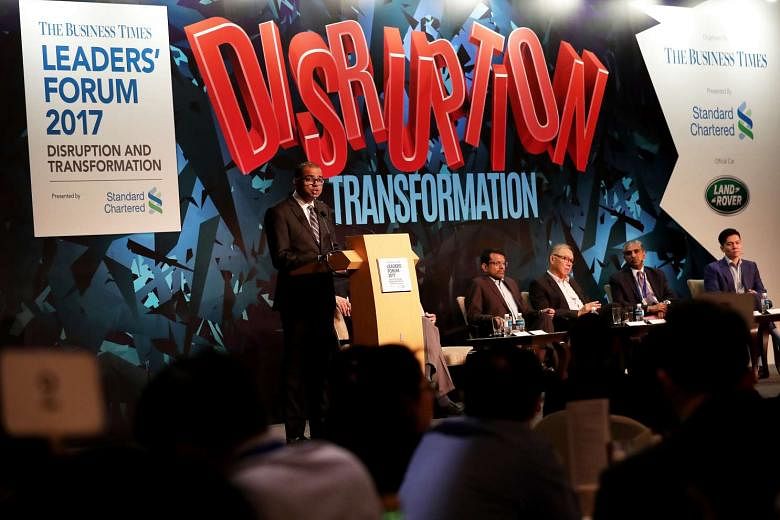Disruption has become a buzzword in almost every sector, with companies and governments fighting to drive innovation and develop the next wave of game-changing technologies.
But when it comes to coping with change and becoming more accepting of failure, most organisations still have some way to go, according to speakers at The Business Times Leaders' Forum.
The event, held yesterday at The Ritz-Carlton Millenia Singapore, was attended by 400 people including business leaders, policymakers and academics.
Speakers tackled topics such as innovation, disruption in government and the future of jobs.
"If we do not disrupt ourselves in a manner of our choosing, somebody else will do so in a manner we do not like," said Monetary Authority of Singapore (MAS) managing director Ravi Menon.
Mr Menon, who spoke as part of a panel, also said companies and policymakers need to be more open to experimentation and prepared to accept failure. "Experimentation is the only way to find out what works and what doesn't," he added.
"Many experiments fail; that's a necessary part of experimentation. If all experiments succeed, then those are not experiments; they did not push the boundaries."
This also applies to regulators, Mr Menon said, citing MAS' fintech regulatory sandbox as an example.
The sandbox allows start-ups and large financial companies to test their products in a controlled environment, by limiting the scale and reach of the experiment.
"There is no guarantee the regulatory sandbox will succeed - it is in itself an experiment. But we think it's worth a try," Mr Menon said.
Dr Janil Puthucheary, the Minister in charge of the Government Technology Agency (GovTech), agreed that a culture of experimentation is essential, even in the Government.
GovTech - a new statutory board under the Ministry of Communications and Information which will examine how technologies can be used in the public sector - is an example of "Government disrupting itself", he added.
GovTech will report to a new Smart Nation and Digital Government Group (SNDGG), whose priorities include developing a digital identity system, a nationwide electronic payments system and an islandwide wireless sensor network, said Dr Puthucheary.
Home-grown Internet company Garena's group president Nick Nash said it can be tempting for companies and investors to get caught up in the latest start-up trends - from group buying sites to e-commerce and fintech. But truly disruptive innovators seek out under-served potential customers and try to solve their problems.
In fintech, for instance, a key challenge is creating "the next one billion checking accounts" - reaching out to large swathes of the population in the region who have limited access to banking services.


